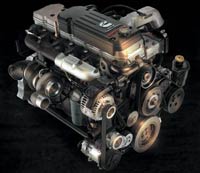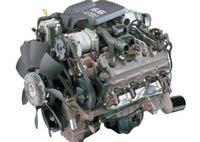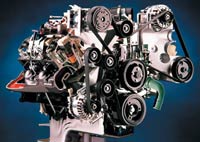Reasons why diesel engins are
far superior to gasoline engines:
Reasons why
diesel engines are far superior to gasoline engines.
 Far
more torque. A typical gasoline engine has a torque to
horsepower ratio of something like 0.9 : 1. A diesel on the
other hand is more like 2.5 : 1 or even higher. Why is torque so
important? Well, torque is what actually supplies the power to
move the vehicle and anything you might be towing. Horsepower
tells you how "quickly" you can apply that torque to
the ground. A big rig might only have a 400 HP engine, but it
also puts out 2000+ pound feet of torque. That's why a big rig
goes up steep hills so slowly when he's loaded, but he can do
that forever. If a big rig had a gas engine in it, he would slow
down much sooner, and he would likely not even be able to make
it up a really steep hill, because he would simply not have near
enough torque to pull himself up the hill. Far
more torque. A typical gasoline engine has a torque to
horsepower ratio of something like 0.9 : 1. A diesel on the
other hand is more like 2.5 : 1 or even higher. Why is torque so
important? Well, torque is what actually supplies the power to
move the vehicle and anything you might be towing. Horsepower
tells you how "quickly" you can apply that torque to
the ground. A big rig might only have a 400 HP engine, but it
also puts out 2000+ pound feet of torque. That's why a big rig
goes up steep hills so slowly when he's loaded, but he can do
that forever. If a big rig had a gas engine in it, he would slow
down much sooner, and he would likely not even be able to make
it up a really steep hill, because he would simply not have near
enough torque to pull himself up the hill.
Far better fuel economy. A typical gas
engine that fits in a full size pickup truck will be extremely lucky to
get better than say 12 or 13 MPG, unless it's a very small block engine. A
similar sized diesel will easily get 18 MPG or better. This is part due to
the chemical properties of diesel fuel and gasoline. Diesel has more
potential energy in it than gas does, so it takes significantly less
diesel fuel to get the same amount of released (useable) energy.
 Much
longer engine life. Why? By it's nature, a diesel engine simply
must be built much, much beefier than a gas engine. A gas engine
has spark plugs which cause the fuel/air mixture to ignite in
the cylinders. A diesel is a compression engine, meaning it
squeezes the air until it builds up enough
heat then injects the diesel fuel in the cylinder causing it to ignite on its own, which is a much more powerful
explosion inside the cylinder than a gas engine experiences.
Hence, in order to handle that extra explosive force, a diesel
engine has to be much heavier duty than an equivilant gas
engine. This therefore leads to the engine being able to last
far longer than a gas engine, assuming proper maintenance is
done on it, which of course applies to any engine, regardless of
what fuel it uses. As an example, a typical gasser is intended
for 200,000 miles of life before it needs any serious engine
work. And that's only the more modern gas engine designs in the
last 15 years. The Cummins engine in my truck is designed to go
500,000 miles before it requires any major engine work. Again,
all these miles are assuming regular maintenance is done on the
engine/vehicle. Much
longer engine life. Why? By it's nature, a diesel engine simply
must be built much, much beefier than a gas engine. A gas engine
has spark plugs which cause the fuel/air mixture to ignite in
the cylinders. A diesel is a compression engine, meaning it
squeezes the air until it builds up enough
heat then injects the diesel fuel in the cylinder causing it to ignite on its own, which is a much more powerful
explosion inside the cylinder than a gas engine experiences.
Hence, in order to handle that extra explosive force, a diesel
engine has to be much heavier duty than an equivilant gas
engine. This therefore leads to the engine being able to last
far longer than a gas engine, assuming proper maintenance is
done on it, which of course applies to any engine, regardless of
what fuel it uses. As an example, a typical gasser is intended
for 200,000 miles of life before it needs any serious engine
work. And that's only the more modern gas engine designs in the
last 15 years. The Cummins engine in my truck is designed to go
500,000 miles before it requires any major engine work. Again,
all these miles are assuming regular maintenance is done on the
engine/vehicle.
 Also,
on a related note, diesel fuel (more properly called diesel oil)
is classified as an oil - a lubricant. Gasoline is classified as
a solvent. Just think of what that does to the inside of an
engine over time... Also,
on a related note, diesel fuel (more properly called diesel oil)
is classified as an oil - a lubricant. Gasoline is classified as
a solvent. Just think of what that does to the inside of an
engine over time...
Sometimes cheaper maintenance costs. Why?
Well, diesel engines just don't have as many parts as a gas engine does.
Like I said above, a diesel doesn't have spark plugs. Therefore, it also
doesn't have spark plug wires, a distributor or any of that sort of parts
which need to be replaced periodically on a gasser. However, some
maintenance costs are more for a diesel. A diesel engine uses much more
engine oil than a gasser does, and usually more coolant. So, when it comes
time to change these things, you will of course pay more.
Sometimes diesel fuel is cheaper than
gasoline, but not always.
Now a little trivia: A diesel
engine can burn other fuels with absolutely no modifications at
all. Rudolph Diesel, the inventor of the Diesel engine, actually
ran his engine on peanut oil when he first introduced it to the
world. Diesels can run on a variety of what are collectively
referred to as bio-diesel fuels. These include vegetable oils of
many sorts, including used deep frying oil. It is true that some
modern gasoline powered automobiles can run methanol, but you
would first need to change the engine oil from conventional to
full synthetic in order to safely run methanol fuel
|